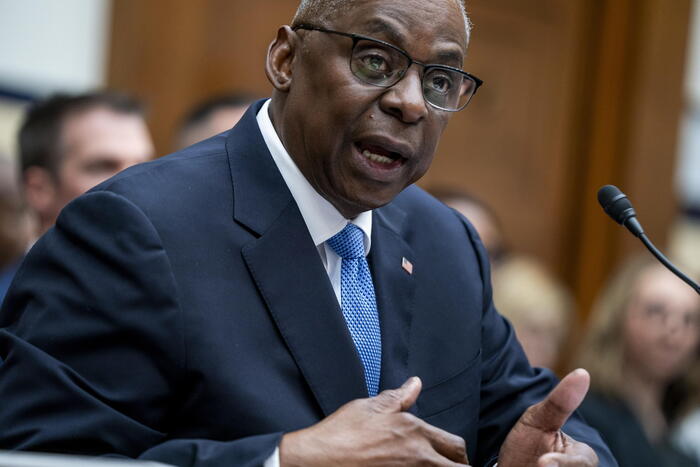Crucial sentence in the fine print: That's what the Ukraine conflict with Russia is about
Created: 2/22/2022Updated: 2/22/2022 1:44 p.m
By: Sven Hauberg
A woman in St. Petersburg watches on TV as Russian President Putin speaks on recognizing the self-proclaimed People's Republics of Donetsk and Luhansk.
© EPA/Anatoly Maltsev
Joining NATO is Ukraine's national goal.
This was not always the case - only the annexation of Crimea put membership back on the political agenda.
Putin, on the other hand, warns against this step.
Kiev - Sometimes a look at the fine print helps.
According to the North Atlantic Treaty, anyone who wants to become a member of NATO must not be involved in an international conflict.
"Each Party declares that none of the international obligations currently in force between it and any other Party or third country conflicts with the provisions of this Treaty," reads Article 8 of NATO's founding document.
Ukraine's membership in the military alliance is therefore currently ruled out.
And not just since Vladimir Putin recognized the separatist areas in Donetsk and Luhansk on Monday evening* (February 21).
After all, the conflict with Russia goes back further.
In 2014, the parliament of the Crimean Peninsula in southern Ukraine declared its independence from Kiev;
after the invasion of Russian troops and an internationally disputed referendum, Crimea was then incorporated into Russian territory.
In the east of the country, in the Donetsk and Luhansk oblasts, the situation escalated only a short time later.
Separatists backed by Russia began fighting Ukrainian government forces, and thousands of people died in the years that followed*.
It is these conflicts that actually make NATO membership for Ukraine* impossible.
In the past few weeks, however, there has been much talk about Kiev's desire to join.
A wish that was only really given impetus by the Russian annexation of Crimea.
It was Petro Poroshenko, President of Ukraine from 2014 to 2019, who pushed for his country to join NATO in the face of Russian aggression.
Poroshenko promised a referendum on possible membership, which never took place.
NATO membership of Ukraine: Angela Merkel urged restraint
In the years before the annexation, however, possible NATO membership was hardly an issue, even if it would have been theoretically possible at the time.
The NATO-Ukraine Charter was passed in 1997, six years after Ukraine's independence.
However, the document only established military cooperation between the two partners, not membership.
Efforts by then US President George W. Bush to promote Ukraine's accession to NATO also came to nothing.
Because Angela Merkel*, then Chancellor, and the French President at the time, Nicolas Sarkozy, put on the brakes: they didn't want to alienate Russian President Putin.
Although all options were kept open, accession should not happen now.
Namely, and this has become clear once again in the past few weeks, Putin regards Ukraine on the one hand as a historical part of Russia*, but at the same time also as a buffer state to the western defense alliance.
When Viktor Yanukovych took over the presidency of Ukraine in 2010, he pursued a pro-Russian policy - he rejected his country's accession to NATO.
The Maidan protests, the Crimean invasion and the formation of a new Ukrainian government led to a rethink.
This even made membership of the North Atlantic Treaty a national goal and wrote the desire to join the constitution.
The West reacted by officially making Ukraine a candidate country - despite the situation in the east of the country.
Russia and NATO: Putin demands written guarantees
Meanwhile, NATO itself had expanded eastward in several rounds of expansion.
The Czech Republic, Poland and Hungary joined the alliance in 1999, followed five years later by the Baltic states of Estonia, Latvia and Lithuania as well as Slovakia, Slovenia, Bulgaria and Romania.
By signing the NATO-Russia Founding Act*, the Kremlin had already agreed on paper to eastward expansion in 1997.
Most recently, Putin has repeatedly demanded a written guarantee that Ukraine would not be admitted to NATO.
The West rejects this suggestion - with reference to the right of sovereign states to decide on their own future.
German Chancellor Olaf Scholz, for example, rejected a quick accession by Kiev.
During his visit to the Kremlin last week*, Scholz told the Russian President that Ukrainian NATO membership was "not an issue that we are likely to encounter in our offices, at least as long as we hold them".
NATO accession of Ukraine: German majority against
CDU leader Friedrich Merz and CSU leader Markus Söder also recently spoke out against joining soon.
"Ukraine is not a NATO member and will not become one in the foreseeable future," Merz told Die
Welt on Sunday
.
A majority of Germans took a similar view - at least before the most recent escalation: According to the ARD Germany trend of February 17, 31 percent of those surveyed spoke out against joining in the coming years, and 22 percent even want to rule this out permanently.
Only 28 percent are against denying Ukraine membership in NATO.
Putin*, however, promises like those of Scholz are not enough.
"We believe that this is not a concession to us," Putin said at a Security Council meeting in Moscow on Monday.
"This is not a moratorium for us, they are making this moratorium for themselves." He again called for a permanent renunciation of Ukraine's NATO membership.
British Foreign Secretary Liz Truss, on the other hand, spoke out against Ukraine voluntarily renouncing NATO membership.
The notion that "an invasion could be averted by Kiev renouncing NATO membership" is wrong, Truss told
Welt am Sonntag
.
They now seem to confirm Putin's decision to recognize the eastern Ukrainian separatist areas*.
(sh)*Merkur.de is an offer from IPPEN.MEDIA.














